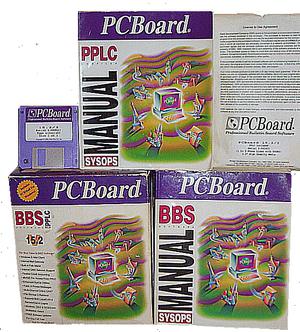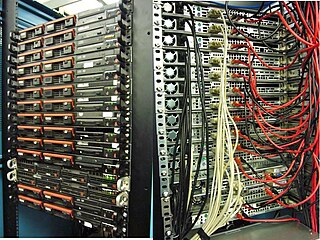
A bulletin board system (BBS), also called a computer bulletin board service (CBBS), is a computer server running software that allows users to connect to the system using a terminal program. Once logged in, the user performs functions such as uploading and downloading software and data, reading news and bulletins, and exchanging messages with other users through public message boards and sometimes via direct chatting. In the early 1980s, message networks such as FidoNet were developed to provide services such as NetMail, which is similar to internet-based email.
FidoNet is a worldwide computer network that is used for communication between bulletin board systems (BBSes). It uses a store-and-forward system to exchange private (email) and public (forum) messages between the BBSes in the network, as well as other files and protocols in some cases.
Shareware is a type of proprietary software that is initially shared by the owner for trial use at little or no cost. Often the software has limited functionality or incomplete documentation until the user sends payment to the software developer. Shareware is often offered as a download from a website. Shareware differs from freeware, which is fully-featured software distributed at no cost to the user but without source code being made available; and free and open-source software, in which the source code is freely available for anyone to inspect and alter.

CompuServe, Inc. was an American Internet company that provided an eponymous online service, the first major commercial one in the world. It opened in 1969 as a timesharing and remote access service marketed to corporations. After a successful 1979 venture selling otherwise under-utilized after-hours time to Radio Shack customers, the system was opened to the public, roughly the same time as The Source.
An online service provider (OSP) can, for example, be an Internet service provider, an email provider, a news provider (press), an entertainment provider, a search engine, an e-commerce site, an online banking site, a health site, an official government site, social media, a wiki, or a Usenet newsgroup.

Prodigy Communications Corporation was an online service from 1984 to 2001 that offered its subscribers access to a broad range of networked services. It was one of the major internet service providers of the 1990s.
The Bread Board System (TBBS) is a multiline MS-DOS based commercial bulletin board system software package written in 1983 by Philip L. Becker. He originally created the software as the result of a poker game with friends that were praising the BBS software created by Ward Christensen. Becker said he could do better and founded eSoft, Inc. in 1984 based on the strength of TBBS sales.

PCBoard (PCB) was a bulletin board system (BBS) application first introduced for DOS in 1983 by Fred Clark's Clark Development Company. PCBoard was one of the first commercial BBS packages for DOS systems, and was considered one of the "high end" packages during the rapid expansion of BBS systems in the early 1990s. PCB was used as the basis of some of the largest bulletin board systems of the era, like Canada Remote Systems.
ARC is a lossless data compression and archival format by System Enhancement Associates (SEA). The file format and the program were both called ARC. The format is known as the subject of controversy in the 1980s, part of important debates over what would later be known as open formats.
VBBS is an acronym for Virtual Bulletin Board System. It was a shareware bulletin board system (BBS) for DOS that was conceived by Roland De Graaf in 1990. Written from scratch in QuickBASIC, it developed a loyal following. Originally it was a door for WWIV, but quickly grew into an original BBS concept on its own. By 1993, there were thousands of computers running VBBS around the world. VirtualNET, the largest VBBS message network, had close to 1500 members by version 6.14 in 1993.
Canada Remote Systems, or simply CRS, was a major commercial bulletin board system located in the Toronto area. It was one of the earliest commercial systems outside the "big iron" companies such as CompuServe or The Source. At times it was the among the largest BBS systems in the world, often trading that position with the US-based Exec-PC, based on the number of telephone lines and its 10,000 user subscriber base. It won the 1992 Readers Choice award in Boardwatch Magazine. It survived into the 1990s, before being overwhelmed by the Internet and closing down.

SPITFIRE is a DOS-based bulletin board system written by Mike Woltz (1945-2022), published by his company Buffalo Creek Software of West Des Moines, Iowa.
Amiga software is computer software engineered to run on the Amiga personal computer. Amiga software covers many applications, including productivity, digital art, games, commercial, freeware and hobbyist products. The market was active in the late 1980s and early 1990s but then dwindled. Most Amiga products were originally created directly for the Amiga computer, and were not ported from other platforms.

RemoteAccess is a DOS Bulletin Board System (BBS) software package written by Andrew Milner and published by his company Wantree Development in Australia. RemoteAccess was written in Turbo Pascal with some Assembly Language routines. RemoteAccess began in 1989 as a clone of QuickBBS by Adam Hudson. It was released under the shareware concept in 1990 and became popular in North America, Europe, UK, South Africa, and the South Pacific. Initially the main advantage over QuickBBS was its ability to run multiple nodes under Microsoft Windows, Quarterdeck's DESQview and OS/2. RA could also operate over a network or even a combination of network and multitasking operating systems to provide multiple "nodes per station" capabilities.
Searchlight BBS is a bulletin board system (BBS) developed in 1985 by Frank LaRosa for the TRS-80. LaRosa formed a company, Searchlight Software, through which he marketed and sold Searchlight BBS. In 1987, LaRosa expanded the software and sold it as shareware written for the PC in Pascal. The features of Searchlight BBS included a full screen text editor, a remote DOS shell, and file transfer via the XMODEM protocol. Searchlight BBS rapidly grew in popularity, and appeared frequently in Boardwatch magazine and at BBS conventions across the United States. Eventually, Searchlight BBS supported FidoNet, ZMODEM, Internet e-mail and telnet connectivity.

Internet in the Philippines first became available on March 29, 1994, 10:18 a.m., with the Philippine Network Foundation (PHNet) connecting the country and its people to Sprint in the United States via a 64 kbit/s link. As of February 2023, there are 85.16 million internet users in the country, where internet penetration stood at 73.1% of the total population.
GT Power is a bulletin board system (BBS) and dial-up telecommunications/terminal application for MS-DOS. It was first introduced in the 1980s by P & M Software, founded by Paul Meiners. GT Power can be used both to host a BBS as well as to connect to other BBS systems via its full-featured dial-up "terminal mode". GT Power was a shareware package that required a registration fee in order to access its proprietary network mail transport/handling software and, by default, the GT Power Network. The software is distributed in two "flavors": a terminal-only version, nicknamed GTO, and the full-featured host and terminal version.
StarDoc 134 is a Dos/Linux hybrid BBS running EleBBS maintained by Andrew Baker aka "RamMan, Dotel and Dotelpenguin".

Super Dimension Fortress is a non-profit public access UNIX shell provider on the Internet. It has been in continual operation since 1987 as a non-profit social club. The name is derived from the Japanese anime series Super Dimension Fortress Macross; the original SDF server was a Bulletin board system created by Ted Uhlemann for fellow Japanese anime fans. From its BBS roots, which have been well documented as part of the BBS: The Documentary project, SDF has grown into a feature-rich provider serving members around the world.









